EDRi-gram, 26 June 2024
Summer seems to have finally arrived in Brussels, just in time for the heart of the EU to reel from the results of the European elections. Maybe having the sun will make it all bearable? Stay tuned as we test out this theory. We do have some positive news to share from the world of digital rights. Earlier this month, LinkedIn gave in to pressure from civil society and Digital Services Act (DSA) enforcers based on a complaint by EDRi and three partner organisations. The platform will no longer allow advertisers to target ads based on sensitive personal data from users. A big win for privacy! On a similar sunny note, EDRi and the Reclaim Your Face campaign were recently recognised as the Europe AI Policy Leader in Civil Society for our groundbreaking work advocating for a world free from biometric mass surveillance. Do you want to read more about the EDRi network’s impact on defending and advancing digital rights? Our 2023 Annual Report is out now for you to peruse!
Do you want to receive all the latest news from the digital rights world?
SUBSCRIBE NOW TO THE EDRi-GRAM!
-

EDRi Annual Report 2023: Our collective impact defending digital rights in Europe
In our Annual Report, you can read more about EDRi’s efforts to build an inclusive and equitable digital environment that allows us all to thrive. In 2023, we...
-
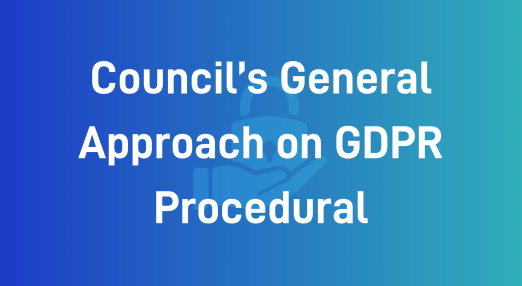
Council’s General Approach on GDPR Procedural
EDRi acknowledges the Council’s positive steps in their General Approach on the Proposal for additional procedural rules concerning the GDPR. Nevertheless, we emphasise the pressing need for enhanced...
-
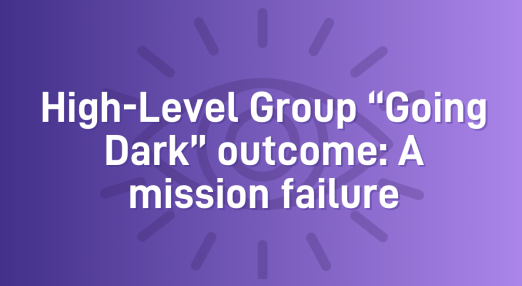
High-Level Group “Going Dark” outcome: A mission failure
On 13 June, the Justice and Home Affairs Council, composed of EU Member States’ ministers of the Interior, will discuss the recommendations of the High-Level Group (HLG) on...
-

EDRi and Reclaim Your Face campaign recognised as Europe AI Policy leaders
EDRi and the Reclaim Your Face coalition were recognised as the Europe AI Policy Leader in Civil Society for our groundbreaking work as a coalition to advocate for...
-

Be scanned – or get banned!
In the latest in a string of alarming developments, the Belgian government has proposed a new supposed 'solution' to the Chat Control deadlock in the Council. Read why...
-

European Court of Human Rights: Secret surveillance in Poland violates citizens’ privacy rights
On 28 May 2024, a precedent judgment was announced by the European Court of Human Rights. The court said that the operational control regime, the retention of communications...
-
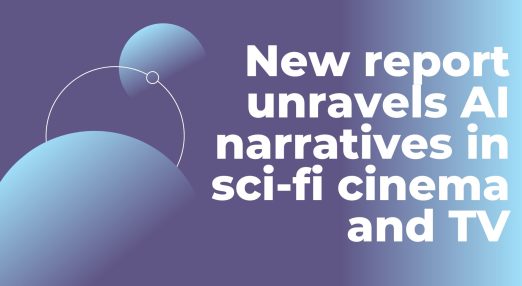
New report unravels AI narratives in sci-fi cinema and TV
Students of the SWPS University’s Institute of Humanities in Warsaw, Poland, published their research on “Visions of AI in Popular Culture: Analysis of the Narratives about Artificial Intelligence...
-
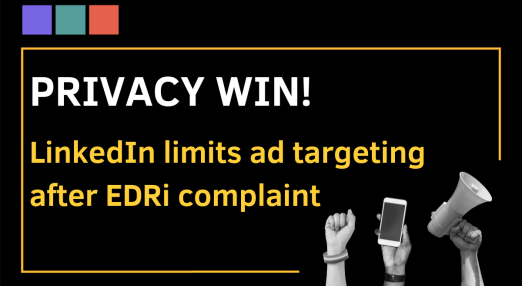
Privacy win: LinkedIn limits ad targeting after EDRi complaint
LinkedIn gave in to pressure from civil society and Digital Services Act (DSA) enforcers based on a complaint by EDRi and three partner organisations. The platform will no...
Donations from readers like you help us to publish the EDRi-gram and bring you the most important digital rights news.
DONATE TODAY
RECOMMENDED

Cover Your Track
EDRi member, Electronic Frontier Foundation (EFF)
How well do your browser and add-ons protect you against online tracking techniques? Find out with a Cover Your Tracks test. It shows you how trackers see your browser, and how uniquely configured—and thus identifiable—it is. In addition to a user tool, Cover Your Tracks is also an ongoing research project to uncover the tools and techniques of online trackers and test the efficacy of privacy add-ons. Find out more.
The Deadly Digital Frontiers at the Border
Petra, who we briefly had the pleasure of hosting as a Mozilla Fellow at EDRi in 2019-20, documents the tyranny of unregulated border technology globally. She urges for stronger laws to prevent human rights abuses at deadly digital frontiers around the world, and asks that the focus of our conversations around borders and migration shift to “the profound human stakes as smart borders emerge around the globe.” Read more.

Why more and more websites make you pay for your privacy
EDRi member, noyb
‘Pay or Okay’ systems are on the rise in Europe. These systems make users choose between either paying a fee or consenting to being tracked for targeted advertising. First introduced by news websites that were suffering from the loss of advertising revenue to big tech platforms, Meta adopted the approach for Instagram and Facebook in November 2023. Instead of asking users for their consent, the company is forcing them to either pay a fee of up to € 251.88 a year or agree to be tracked. Watch this video that explains what is at stake.

AI Safety with Shazeda Ahmed
Philosophy professors talk to AI Safety specialist, Shazeda Ahmed, about the philosophy guiding the development and regulation of AI. Controversial utilitarian principles like Effective Altruism have taken the spotlight recently by touting the ‘existential’ risks of AI, while those who work on AI ethics and safety have raised concerns about real world harms. Moreover, which voices are still missing from this conversation? Listen to the podcast to mull over whether the discipline of philosophy can guide discussion about AI in the right direction.
Join us in shaping our digital spaces for people, democracy and the planet.
EDRi has launched its manifesto for digital futures for people, democracy and the planet. In the 2024 European elections and beyond, we'll tackle challenges like climate change and tech monopolies, standing up for justice, equity, and sustainability. But we can't do this alone. With your support, our bold visions are within reach!
Get involved!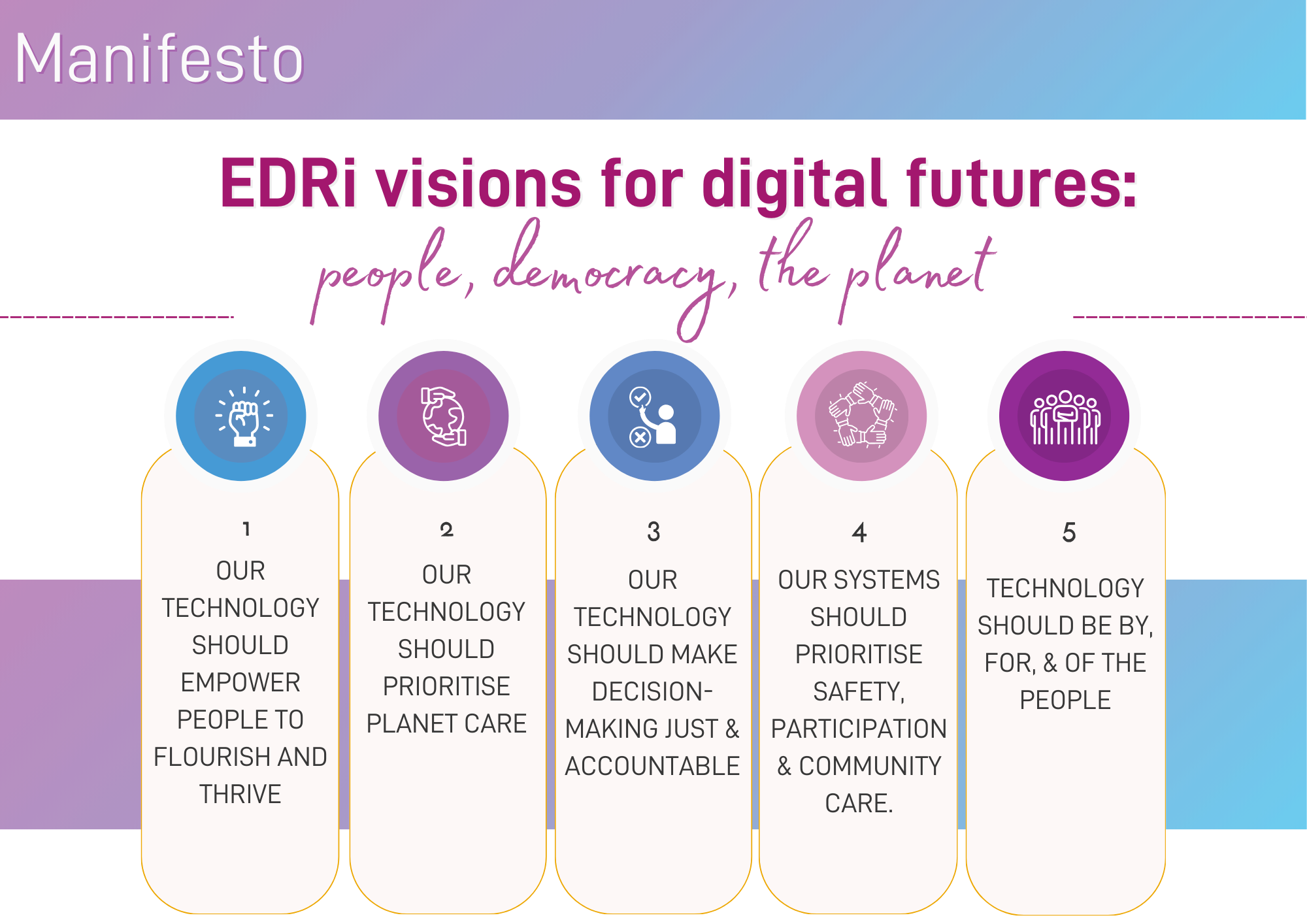
EVENTS
-

Live Podcast #4: Independent Voices Face High Ownership Concentration: Mapping the Cultural Landscape
In 2024, Reset! is heading to Brussels, returning to the network’s origins, at the Reset venue. Dedicated to championing independent cultural and media organisations throughout Europe, Reset! will...
-

The Palestine Digital Activism Forum (PDAF)
The PDAF aims to provide a platform to discuss the challenges that Palestinians face the Palestinian civil society to protect Palestinian digital rights and digital activists working on...
-

Global Digital Intimacies Conference
In the light of these transformations, the Global Digital Intimacies conference aims to gather together scholars from around the world to investigate digital intimacy in all its varieties.
-

2024 Global Gathering
The 2024 Global Gathering (GG) will take place on September 27, 28, and 29 in Estoril, Portugal. The event brings together digital rights networks from around the...
-
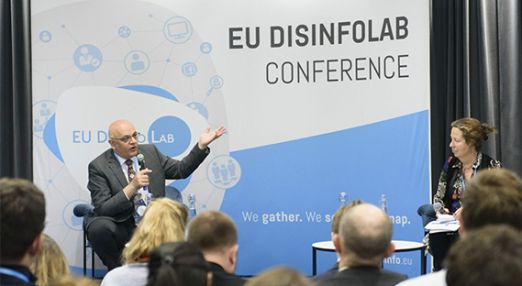
EU DisinfoLab 2024 Annual Conference – open call, sumbit your ideas!
After the successful #Disinfo2023 in Krakow, the 2024 Eu DisinfoLab conference is set to take place in Riga, Latvia, on 9-10 October 2024.
-

A civil society summit on tech, society, and the environment: Meet our key speakers & Explore the Action Desks
We are excited to announce that 41 civil society organisations, including EDRi, will be co-hosting the “Tech and Society Summit” this fall, in October 2024. This event...
JOBS
-

Access Now is hiring for a Platform Engagement Coordinator
Access Now is a growing international human rights organisation dedicated to defending and extending the digital rights of users at risk around the world, including issues of privacy,...
-

Liberties is hiring for an Executive Director
The Civil Liberties Union for Europe is a Berlin-based watchdog that safeguards the human rights of everyone in the European Union. Liberties works on multiple human rights issues,...
-

Mnemonic is hiring for a Service Provision for Travel Management Services
Mnemonic works globally to help human rights defenders effectively use digital documentation of human rights violations and international crimes to support advocacy, justice and accountability.
-

Mozilla is hiring for a Senior Integrated Marketing Manager
Mozilla Foundation is committed to an internet that promotes civil discourse, human dignity, and individual expression. To an internet that catalyzes collaboration among diverse communities working together for...
-

Sovereign Tech Agency is hiring for a Digital Commons EDIC Director
The Sovereign Tech Agency's mission is to imrpove and maintain foundational digital technologies that enable the creation of software. Examples include libraries for programming languages, package managers, open...
-

Wikimedia Foundation is hiring for a Movement Communications Specialist
The Wikimedia Foundation is the nonprofit that hosts Wikipedia and their other free knowledge projects. Wikimedia Foundation wants to make it easier for everyone to share what they...
-

WHAT TO FIX is hiring for a Policy Manager
WHAT TO FIX is a global accelerator of evidence-based tech accountability advocacy, working to move the conversation beyond problems and into actionable diagnoses and solutions.
-

Privacy International is hiring for a Research Consultant – Migration
Since 1990, Privay International has been working to promote the human right of privacy throughout the world: raise awareness of threats to privacy; monitor and report on surveillance...

